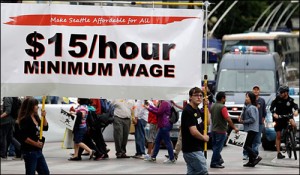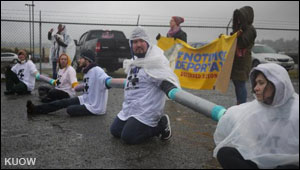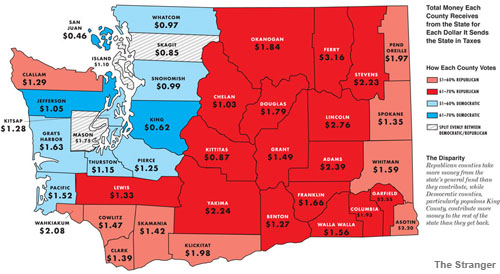NEWS ROUNDUP
Teacher erosion, minimum wage success, our welfare state…
Tuesday, February 25, 2014
STATE GOVERNMENT
► In today’s Seattle Times — Senate schools funding disappoints Inslee — The state Senate on Monday released a proposed budget that would throw some additional money into public schools, but nowhere near the amount called for by Democratic Gov. Jay Inslee.
 ► At Crosscut — Senate GOP unveils budget. Sorry, teachers — Two key numbers were unveiled Monday: $38.3 million for court-ordered school improvements. Zero dollars for teacher cost-of-living raises. Washington’s voters passed an initiative several years ago to require that cost-of-living increases be given to teachers annually. However, recent Legislatures have routinely suspended those raises as a budget-balancing measure.
► At Crosscut — Senate GOP unveils budget. Sorry, teachers — Two key numbers were unveiled Monday: $38.3 million for court-ordered school improvements. Zero dollars for teacher cost-of-living raises. Washington’s voters passed an initiative several years ago to require that cost-of-living increases be given to teachers annually. However, recent Legislatures have routinely suspended those raises as a budget-balancing measure.
EDITOR’S NOTE — It has been six years since teachers have received a COLA, which means six years of watching the value of their compensation erode due to inflation. If we’re serious about wanting great schools, this cannot continue. That’s why the state Supreme Court calls the Legislature’s neglect of teacher salaries “deeply troubling.”
► From AP — Senate budget includes money for immigrant aid bill — The Senate’s majority caucus proposed a supplementary budget that increases funding for a soon-to-be signed measure expanding college financial aid to include students who were brought to the state illegally as children.
► In today’s News Tribune — Senators hear from the public on ways to combat human-trafficking — Human-trafficking is no longer an issue reserved for seedy back alleys in far-off countries. Recent estimates show that roughly 500 children are sold for sex every night in Seattle, and the Legislature is looking at ways to identify and rescue those in sexual slavery.
► From KPLU — Pot tax revenue estimates likely hazy — Washington’s official forecast is to take in $157 million in the next two-year budget cycle, but at lease one expert thinks the state is likely underestimating.
► In the P.S. Business Journal — Small-business exchanges struggle nationally; Washington firms avoid the hassle — Washington is one of two states without a small business health exchange, but it may not be missing out. Nationally, few small-business owners have used the Small Business Health Options Program to buy coverage for their workers, a report indicates.
MINIMUM WAGE
 ► From Bloomberg — Where a higher minimum wage hasn’t killed jobs (by Joni Balter) — A Congressional Budget Office report said that raising the federal minimum wage to $10.10 an hour might cut employment by 500,000 workers. That is balanced by the projection that higher pay could also boost about 900,000 people out of poverty. But some places in the U.S. already have real-life experience with raising their minimum wage. Washington state, for example, has the nation’s highest rate, $9.32 an hour. Despite dire predictions that increases would cripple job growth and boost unemployment, this isn’t what happened.
► From Bloomberg — Where a higher minimum wage hasn’t killed jobs (by Joni Balter) — A Congressional Budget Office report said that raising the federal minimum wage to $10.10 an hour might cut employment by 500,000 workers. That is balanced by the projection that higher pay could also boost about 900,000 people out of poverty. But some places in the U.S. already have real-life experience with raising their minimum wage. Washington state, for example, has the nation’s highest rate, $9.32 an hour. Despite dire predictions that increases would cripple job growth and boost unemployment, this isn’t what happened.
► In today’s Washington Post — GOP poor-mouthing on the minimum wage (by Eugene Robinson) — The purpose of raising the minimum wage is to give those at the bottom of the pay scale something that more closely approximates a living wage. It strikes me as obscene for conservatives to prattle on about the “dignity of work” when workers can toil long and hard in full-time jobs and yet their families can still be poor and in need of government assistance.
LOCAL
 ► In the P.S. Business Journal — Work that works: Big demand for time-honored apprentice programs — Josh Rinehart quit his job as a carpet salesman to become one of Washington state’s roughly 8,500 apprentices — a workforce training program for which there is high demand but very low supply. At 31, he now holds an entry-level job at Machinists Inc. and is on the fast track to becoming a journey-level machinist, a lifetime ticket to gainful employment starting at $28 an hour.
► In the P.S. Business Journal — Work that works: Big demand for time-honored apprentice programs — Josh Rinehart quit his job as a carpet salesman to become one of Washington state’s roughly 8,500 apprentices — a workforce training program for which there is high demand but very low supply. At 31, he now holds an entry-level job at Machinists Inc. and is on the fast track to becoming a journey-level machinist, a lifetime ticket to gainful employment starting at $28 an hour.
► In today’s Seattle Times — King County voters to decide on tax, fee hikes for roads, buses — King County voters will decide in April on a $60 car-tab fee and a tenth-of-a-cent sales-tax increase for roads and buses.
► In today’s News Tribune — Defense secretary’s cuts would affect JBLM, but how much? — Budget proposal would have repercussions in Washington state, in part because it would trim service members’ benefits.
 ► From KUOW — Protesters try to block deportations from Northwest Detention Center — Milton Cornejo locked arms with about a dozen demonstrators Monday morning to block access to the federal Northwest Detention Center in Tacoma. They were among about 50 people trying to prevent vehicles from leaving the facility, saying that they didn’t want the vans leaving with people who are about to be deported on board.
► From KUOW — Protesters try to block deportations from Northwest Detention Center — Milton Cornejo locked arms with about a dozen demonstrators Monday morning to block access to the federal Northwest Detention Center in Tacoma. They were among about 50 people trying to prevent vehicles from leaving the facility, saying that they didn’t want the vans leaving with people who are about to be deported on board.
► In today’s Columbian — Clark County labor talks may be outsourced — Clark County’s labor negotiations could be farmed to an outside consulting group, a county commissioner says, as a way of saving money.
NATIONAL
► At AFL-CIO Now — Labor gains bigger voice on trade, but more transparency vital — Today’s announcement by the office of the U.S. Trade Representative that labor unions are eligible for membership on committees that advise the USTR on and that are kept abreast of trade negotiations is a “welcome change and an important step forward in helping to reform U.S. trade policy so that it can work for working families,” says AFL-CIO President Richard Trumka.
 ► In the San Jose Mercury-News — Safeway in discussions to sell company — In a move poised to rattle the supermarket industry, Safeway announced that it is in talks to sell the company. The announcement, which came with few details and left analysts and investors to guess at who the buyer might be, caps a year of dramatic downsizing as the nation’s second-largest grocery chain has shed hundreds of unprofitable stores. Many industry watchers believe the buyer could be New York-based Cerberus Capital Management, a private equity firm. When Cerberus acquired about 600 Albertsons stores in 2006, it pared them down to about 200 by early 2013.
► In the San Jose Mercury-News — Safeway in discussions to sell company — In a move poised to rattle the supermarket industry, Safeway announced that it is in talks to sell the company. The announcement, which came with few details and left analysts and investors to guess at who the buyer might be, caps a year of dramatic downsizing as the nation’s second-largest grocery chain has shed hundreds of unprofitable stores. Many industry watchers believe the buyer could be New York-based Cerberus Capital Management, a private equity firm. When Cerberus acquired about 600 Albertsons stores in 2006, it pared them down to about 200 by early 2013.
► From AFL-CIO Now — Ohio Republicans, Gov. Kasich greatly weaken right to vote — Last week, the Ohio House of Representatives pushed through two voter suppression bills, previously passed by the state Senate, that would reduce early voting and restrict absentee ballot access. Gov. John Kasich (R) has signed the bills into law.
► In The Hill — Volkswagen vote: Could UAW appeal succeed? — Attorneys and former officials with the National Labor Relations Board say there is precedent for federal officials to toss the results on the grounds that workers felt intimated by politicians.
► In today’s Washington Post — Unions disappointed at 1% pay raise Obama to propose for federal workers — “That recommendation does not even keep up with inflation, which stands at 1.6 percent over the last year,” said IFPTE President Gregory Junemann. AFGE President J. David Cox Sr. called the proposed increase “pitiful.”
► From ProPublica — U.S. lags behind world in temp worker protections — For nearly six years, Limber Herrera has toiled as a temp worker doing the same work for the same company in Mira Loma, Calif. About 40 hours a week, he unloads shipping containers for NFI — one of the largest freight distribution firms in America — moving goods that will eventually stock the shelves of Walmart and Sam’s Club. Herrera, 30, has been a temp so long that he’s outlasted the agency that hired him.
TODAY’S MUST-READ
► Earlier this month in The Stranger — Welfare State — When our state’s rural Republicans toss around pejoratives like “socialism,” “redistribution of wealth,” and “welfare state,” they’re usually hurling them at the People’s Republic of Seattle and the Democratic legislators we send to Olympia. Republican lawmakers make a similar accusation, albeit more veiled, that the state is serving as an engine of wealth redistribution. However, the money is not exactly moving in the direction most Eastern Washingtonians suspect.
Indeed, if Washington is a welfare state, it is residents in these mostly rural, mostly Eastern, mostly Republican counties who are the biggest beneficiaries, while taxpayers here in the blue parts of the state are left footing the bill. And while your typical liberal Seattleite might be neither surprised nor disturbed at this revelation, the degree of the gap between who benefits from state government and who pays for it may come as a bit of a shock.
The Stand posts links to Washington state and national news of interest every weekday morning by 10 a.m.






